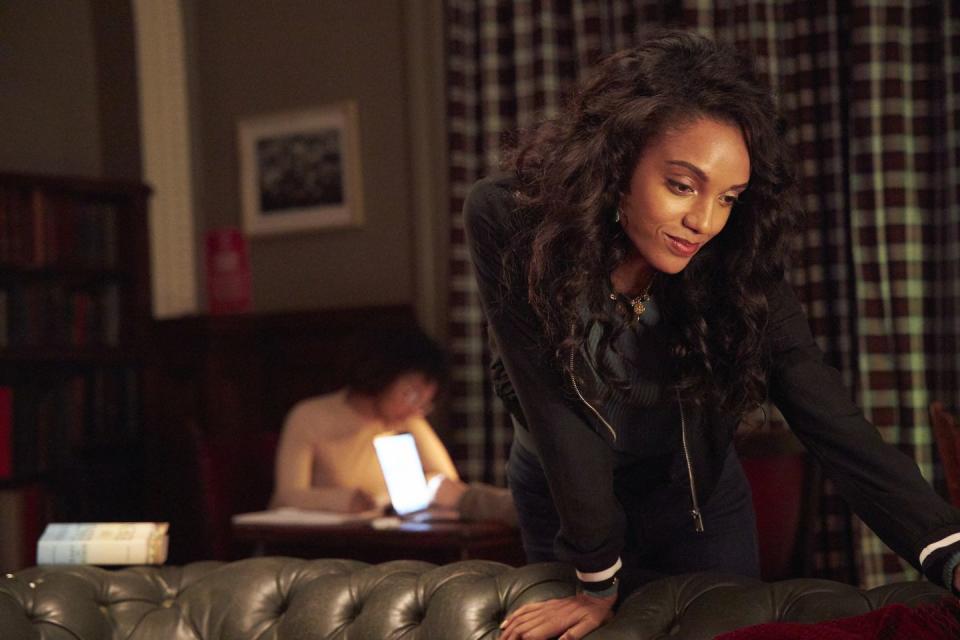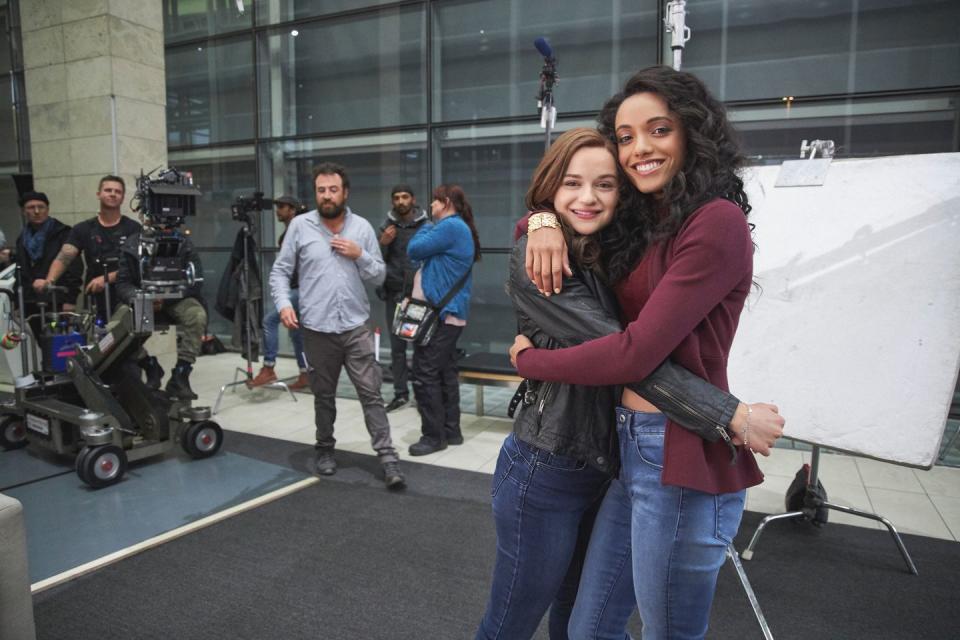Maisie Richardson-Sellers Subverts Expectations in 'The Kissing Booth 2'

Maisie Richardson-Sellers is much more than the Cool Girl. In The Kissing Booth 2, the highly-anticipated sequel to the 2018 Netflix rom-com, she plays Chloe, the potential romantic rival of Joey King's Elle. She's chic, well-traveled, and her ability to hang with the guys at Harvard makes Elle fear the worst about her own relationship with Noah (Jacob Elordi). But by the end of the film, our view of Chloe and her intimidating exterior is complicated by the character's kindness.
Similarly, Richardson-Sellers has spent her career defying easy characterization. She plays shapeshifting superhero Charlie on DC's Legends of Tomorrow, and in 2018 formed Shethority, a global collective "to discuss and conquer the unique challenges of the female experience." Later this year, she'll launch Barefaced Productions, a film company that depicts the stories she didn't see growing up as a young queer Black woman.

Amid social unrest and a global pandemic, Richardson-Sellers keeps evolving—and encourages Hollywood to do the same. "I don't want people to ever get comfy," she tells ELLE.com. "I think this is a time to really push and call and demand for diversity at every stage of the creative process, so that we see honest and organic representation in front of us." The civic-minded actress and filmmaker talks about the Netflix rom-com, her directorial debut, and whether The Kissing Booth 3 is in the cards for her.
How'd you get involved with The Kissing Booth 2?
It actually came to me as a bit of a surprise, because I auditioned, but it was an untitled film. They were hiding all the information and it was all made-up names. I loved the character, and then I found out, on my callback, that it was Kissing Booth 2. To be fair, I'm not big on social media, so I had no idea what a phenomenon the first film had been. But then I watched it, and I remember smiling the whole way through, thinking, "This is such a feel good [movie]." It celebrates quirkiness, uniqueness, and I was really excited to bring a new perspective and some new energy to that, and a bit of diversity, which I think the first film needed.

Your character enters the movie exuding everything Elle feels she's lacking—maturity, sophistication, worldliness. How do you purposefully play someone who's effortlessly cool?
Everyone, no matter how cool they come across, has their flaws, has their weaknesses, has their fears, has their passions and dreams. I started [by] creating a real human—a well-rounded person who happens to have traveled the world. Who happens to live in Zimbabwe and speaks Italian and has been exposed to so many different cultures. Therefore, she finds it easy to assimilate into different worlds. How you see her in the film is not how she would be when she's back in Zimbabwe, with her family there. She's multifaceted.
Chloe's introduced as a woman Noah might be cheating with. But by the end, she's the couple's biggest fan. The movie doesn't pit these two female characters against each other. Was that something that drew you to the role?
Hugely. I'm so fed up with seeing that. It doesn't give a positive message and I don't think it's realistic. I have so many incredible women in my life who uphold each other and empower each other, and that's the message I want to convey. What the film does well is lead us into a sense that we're falling into this trap, and then it confronts you and makes you feel a bit silly for having a feud [in mind], just like Elle does. It takes the stereotype and turns it on its head, which is really interesting, especially within the YA rom-com genre.

What was it like working with Jacob and Joey?
We had the best times. We were in South Africa together for four months. We were each other's support, we were each other's family. We had way too many long rambling field walks and hikes, climbing mountains, [going on a] safari. It was a blast, and everybody spent so much time together. Everybody has those first day nerves of thinking, "Am I going to fit in? Are they going to be welcoming?" And they completely opened their arms and hearts to working with me. It was a seamless transition. Definitely a family I'm going to maintain.
Your Legends of Tomorrow character Charlie is an all-too-infrequent example of a queer Black superhero. What was the response from fans who may not have seen a superhero who represents their experience before?
The Legends fan base is incredible. They're extremely supportive and really loving and open. I've had so many great conversations at conventions with fans saying how it has impacted them. I know growing up as a queer woman of color, how important seeing those characters were for me—they were so few and far between for me and so limited to certain genres. It's inspiring and humbling. I feel proud to be part of increased diversity and representation onscreen, especially within these alternative genres.

Can you tell me about Barefaced Productions—why now, and which stories are you itching to tell most?
You know, there's so much to be gained from other people's experiences. Barefaced came from a need—a need to organically create stories that are representative of the experiences of people in this world. We had a heavy focus on having diversity at every stage of the creative process, behind and in front of the camera. It's also a platform for other marginalized community filmmakers to be able to tell their stories.
You directed the short film Sunday's Child. What about that story made you want it to be your first directorial project?
It's inspired by my experiences and it follows this young queer woman of color who is on the brink of discovering self-love and celebrating who she is. She just moved to L.A. and she's very isolated and having some problems with her family understanding her sexuality. She finds this community of QTPOC artists who accept her for exactly who she is. It's the first time she's seen and loved and appreciated for who she is, and the power that has to start her journey to self-acceptance. It's a positive message for me and it's for all those people out there who haven't found their community yet.
A post shared by Maisie Richardson-Sellers (@maisiersellers) on Jan 5, 2020 at 3:01pm PST
Are there artists who made you feel understood in that same way?
It was very slim pickings when I was young in terms of both having my queerness and my Blackness represented. When I watched The L Word, when I was probably 15, that was huge to me, to see Bette Porter, who was an openly gay biracial woman who was hugely successful and powerful and cool and fun. It was actually one of the first things that inspired me to start reaching out and finding my own queer community, and that started a lifelong journey. I'm so grateful for people helping to stamp [out] my own shame and self-doubt.
Sunday's Child had a female-led crew. What was that set experience like?
Having been in these very white male spaces, when I'm creating, I want to turn [that] on its head. This story is about a young queer woman of color, so why not have it made by young queer women? In the end we had 80 percent female crew and 80 percent people of color, and it created this amazing energy and space where everyone was giving their ideas, their input, and their own experiences. It made it so collaborative. They brought their own nuances to the film, which is what makes it the rich, complex story it is.
The Kissing Booth 2 ends on a a cliffhanger about which college Elle is going to attend. Will you be involved in the third movie?
I would love to. There's so much more to be seen with Chloe and Elle. I'd love to see their friendship, I'd love to see where Elle goes to. And it's such a huge transition going from school to university. I remember it so clearly. You change so much in that time, so it would just be really cool to watch her grow up a bit and see the woman she becomes.
This interview has been edited and condensed for clarity.
Styled by Amanda Lim. Hair by Marjorie Lightford. Makeup by Aaron Paul.
You Might Also Like

